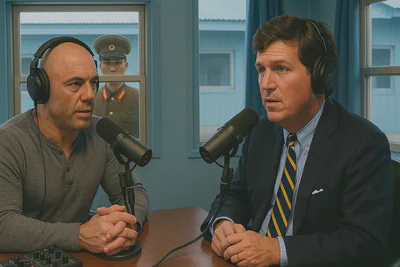South Korea’s next president desperately needs a new foreign media strategy

The next South Korean President, or let’s just call it now—Lee Jae-myung, will inherit more than a fractured domestic landscape. They’ll inherit Donald Trump. Lee will be dealing with a man who runs U.S. diplomacy on podcast and social media vibes, Fox News soundbites, and showmanship.
The recent meeting between Trump and South African President, Cyril Ramaphosa, is indicative of what awaits South Korea.
Ramaphosa visited the White House with the aim of improving trade relations and addressing tensions over land reform policies. Ramaphosa was in no way prepared for what occurred—a sharp deviation from diplomatic and presidential protocol.
Rather than frank discussions behind closed doors, Trump played a video featuring opposition chants and images of crosses, suggesting they were burial sites for murdered white farmers. It was a stageshow that sought to confront Ramaphosa with claims of a “white genocide” in South Africa. Ramaphosa meekly responded by claiming that the chants did not reflect government policy and that the crosses were part of a protest exhibit, not actual graves.
Ramaphosa faced exactly the same “White House crowd bullying” as Zelensky. It was not pretty. Regardless of your opinion on Ramaphosa and South Africa or Zelensky and Ukraine - they were stark departures from diplomatic and presidential convention. It was reality TV spectacle.
Ramaphosa’s advisors should have simply watched the relevant Joe Rogan Experience and Tucker Carlson podcasts, paid attention to the conservative social media spruikers, and been ready to respond—or even better, controlled the narrative before it reached Trump’s narrow media focus.
Lee will be faced with not just a diplomatic challenge but a test of how to conduct serious foreign policy with a counterpart who treats State Department briefings like annoying spam folders and gets his impressions from whatever Tucker Carlson, Joe Rogan, or Newsmax decides is today’s threat.
With the Trump White House, traditional diplomatic engagement becomes something closer to a media campaign. And the horrifying truth? That is actually the smart play.
U.S. intelligence and defense agencies spend millions collecting data and analysis on allies like South Korea. But under Trump, none of that will matter unless it aligns with what he already believes—or what he just saw on TV.
During his first term, we saw Trump brushed aside intelligence briefings, contradict national security officials, and make foreign policy decisions seemingly mid-Tweet. Seoul remembers this all too well.

Trump’s impression of South Korea was mostly shaped by three recurring themes in the American media: 1) U.S. troops are being exploited, 2) South Korea is freeloading, and 3) North Korea diplomacy has failed. This perception wasn’t crafted in a classified intelligence report or during a formal summit. It was shaped by Sean Hannity’s monologues, exaggerated cost-sharing headlines, and the performative theater of the Trump-Kim summits.
Trump’s opinions about the next South Korean president will not be through NSC briefings, but through a primetime segment, a Breitbart headline, or a meme-laden social media spruik.
This dysfunctional information ecosystem creates a strange opportunity for South Korea: perception is policy. If the next administration in Seoul wants to maintain a stable alliance with Washington, they don’t need to impress the Pentagon.
The next Korean president needs to impress Trump—or more precisely, the Trump media orbit.
This means the South Korean government could, in theory, shape Trump’s views by strategically feeding stories into the U.S. media ecosystem. It’s a dystopian version of strategic communications: planting stories in U.S. outlets that portray South Korea as indispensable, patriotic, anti-China, pro-Trump, or anything else that flatters the narrative Trump is currently buying.

South Korean diplomats might soon find themselves needing fewer policy analysts and more Fox News whisperers. It’s not unthinkable that maintaining the alliance will involve courting think tank pundits who appear on conservative talk shows, hiring PR firms to ghostwrite op-eds about shared “freedom values,” or crafting viral YouTube videos of Lee Jae-myung praising American veterans.
It’s cynical, yes. But not unwise. Of course, this approach comes with risks.
The U.S.-ROK alliance is built on decades of military coordination, economic cooperation, and diplomatic trust. Reducing it to a PR campaign risks long-term damage. But Trump’s diplomacy has never been about the long term. It’s transactional, performative, and deeply insecure. And that makes it vulnerable to manipulation—if done carefully.
The biggest danger is backlash. If Trump suspects he’s being managed, or if his media allies turn on Seoul, things could sour quickly. He is notoriously vengeful.
A few bad headlines and he might start demanding troop withdrawals again, or imposing tariffs “to punish the ungrateful Koreans.”
South Korea already spends a lot on strategic communication in Washington. It consistently ranks among the top foreign governments in terms of lobbying expenditures in the U.S. The problem is South Korea currently spends it in the wrong places—supporting what Trump would see as “deep state” think tank specialists, lobbyists outside of the Trump circle, and academics promoting policies that fit neatly into Biden’s foreign policy goals.
Why not sponsor Tucker on a trip to the DMZ? Let Joe Rogan run a podcast from the one of the “Blue Huts”—the United Nations Command Military Armistice Commission (UNCMAC) conference buildings in the Joint Security Area? Or invite the entire Fox News crew to a snake eating session at ROKMC survival training? Let the news media reach Trump in a way that intelligence briefs do not!

Lee will need a shadow media strategy team that treats Washington not as a coherent state actor, but as a schizophrenic stage where policy is theater and the script is improvised nightly. The South Korean president will have to make bold policy decisions while simultaneously managing Trump’s impression of those decisions—two often contradictory tasks.
What might this look like in practice? Picture this: a viral clip of Lee honoring U.S.-ROK veterans goes viral on a conservative talk show. Trump sees it. He smiles. He decides Lee is “a good guy.”
A week later, Seoul quietly pushes back on a new U.S. steel tariff—but because Trump likes Lee’s “attitude,” he lets it slide. This isn’t hypothetical. It’s how Trump operates.
Trump doesn’t read cables. He watches cable. He doesn’t study country briefs. He studies ratings. And he won’t judge South Korea’s next president by strategic vision or diplomatic finesse.
Trump will judge Seoul by how he feels—often in the moment, often misinformed, and always susceptible to flattery.
So if South Korea wants to survive the coming Trump encounter without daily meltdowns, it needs to stop thinking like a nation-state and start thinking like a media-savvy brand. In other words, the next Korean president doesn’t just need a national security council. He needs a brand content strategy.
